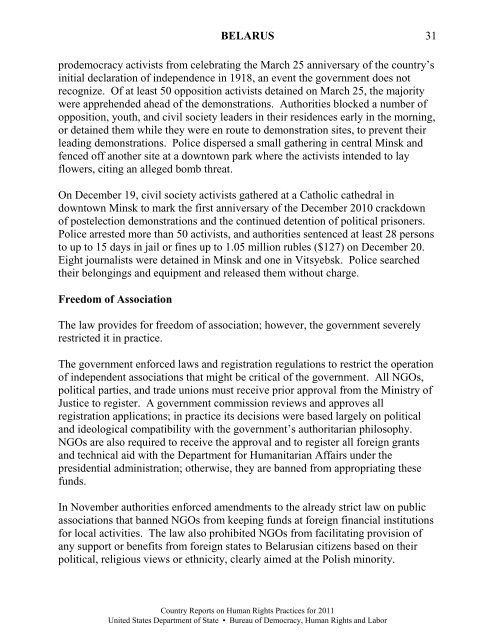belarus executive summary - US Department of State
belarus executive summary - US Department of State
belarus executive summary - US Department of State
Create successful ePaper yourself
Turn your PDF publications into a flip-book with our unique Google optimized e-Paper software.
BELAR<strong>US</strong> 31<br />
prodemocracy activists from celebrating the March 25 anniversary <strong>of</strong> the country’s<br />
initial declaration <strong>of</strong> independence in 1918, an event the government does not<br />
recognize. Of at least 50 opposition activists detained on March 25, the majority<br />
were apprehended ahead <strong>of</strong> the demonstrations. Authorities blocked a number <strong>of</strong><br />
opposition, youth, and civil society leaders in their residences early in the morning,<br />
or detained them while they were en route to demonstration sites, to prevent their<br />
leading demonstrations. Police dispersed a small gathering in central Minsk and<br />
fenced <strong>of</strong>f another site at a downtown park where the activists intended to lay<br />
flowers, citing an alleged bomb threat.<br />
On December 19, civil society activists gathered at a Catholic cathedral in<br />
downtown Minsk to mark the first anniversary <strong>of</strong> the December 2010 crackdown<br />
<strong>of</strong> postelection demonstrations and the continued detention <strong>of</strong> political prisoners.<br />
Police arrested more than 50 activists, and authorities sentenced at least 28 persons<br />
to up to 15 days in jail or fines up to 1.05 million rubles ($127) on December 20.<br />
Eight journalists were detained in Minsk and one in Vitsyebsk. Police searched<br />
their belongings and equipment and released them without charge.<br />
Freedom <strong>of</strong> Association<br />
The law provides for freedom <strong>of</strong> association; however, the government severely<br />
restricted it in practice.<br />
The government enforced laws and registration regulations to restrict the operation<br />
<strong>of</strong> independent associations that might be critical <strong>of</strong> the government. All NGOs,<br />
political parties, and trade unions must receive prior approval from the Ministry <strong>of</strong><br />
Justice to register. A government commission reviews and approves all<br />
registration applications; in practice its decisions were based largely on political<br />
and ideological compatibility with the government’s authoritarian philosophy.<br />
NGOs are also required to receive the approval and to register all foreign grants<br />
and technical aid with the <strong>Department</strong> for Humanitarian Affairs under the<br />
presidential administration; otherwise, they are banned from appropriating these<br />
funds.<br />
In November authorities enforced amendments to the already strict law on public<br />
associations that banned NGOs from keeping funds at foreign financial institutions<br />
for local activities. The law also prohibited NGOs from facilitating provision <strong>of</strong><br />
any support or benefits from foreign states to Belarusian citizens based on their<br />
political, religious views or ethnicity, clearly aimed at the Polish minority.<br />
Country Reports on Human Rights Practices for 2011<br />
United <strong>State</strong>s <strong>Department</strong> <strong>of</strong> <strong>State</strong> • Bureau <strong>of</strong> Democracy, Human Rights and Labor
















